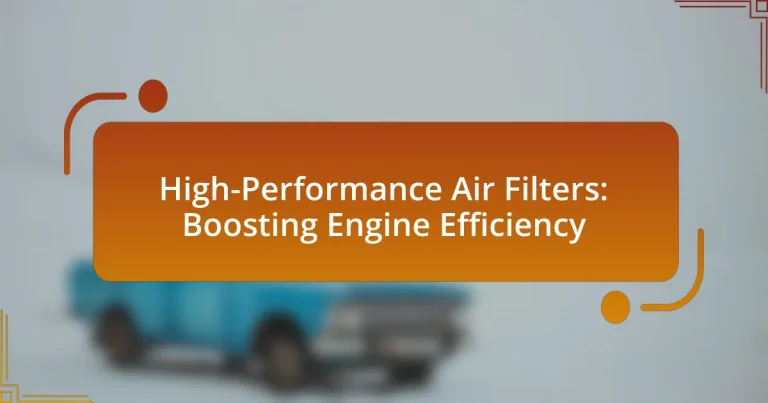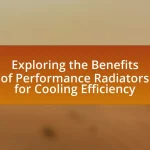High-performance air filters are specialized filtration devices designed to enhance airflow and improve engine efficiency in vehicles. These filters utilize advanced materials and designs to provide superior filtration compared to standard air filters, resulting in increased horsepower and torque. The article explores the differences between high-performance and standard air filters, the materials used, and how their design enhances airflow. It also discusses the importance of these filters for engine efficiency, their long-term advantages, and best practices for selection, installation, and maintenance. Additionally, common misconceptions about high-performance air filters are addressed, providing a comprehensive understanding of their role in optimizing engine performance.
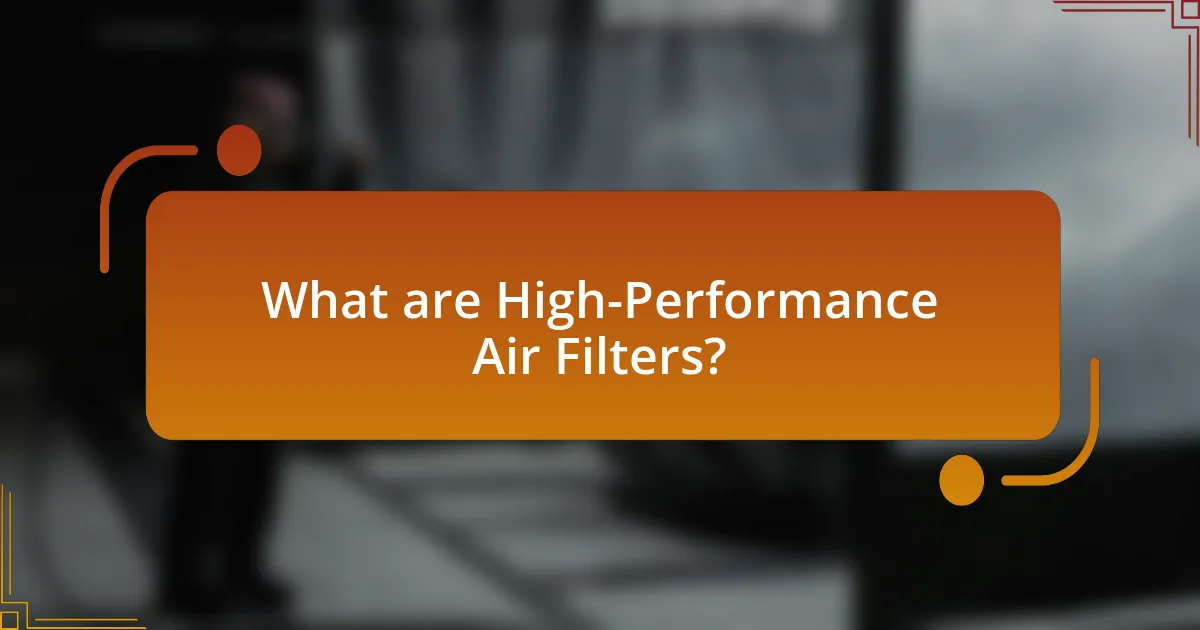
What are High-Performance Air Filters?
High-performance air filters are specialized filtration devices designed to enhance airflow and improve engine efficiency in vehicles. These filters utilize advanced materials and designs, such as synthetic fibers or multi-layer constructions, to provide superior filtration compared to standard air filters. Studies have shown that high-performance air filters can increase horsepower and torque by allowing more air to enter the engine, which is essential for optimal combustion. For example, a test conducted by K&N Engineering demonstrated that their high-flow air filters could improve engine performance by up to 10% in certain applications.
How do High-Performance Air Filters differ from standard air filters?
High-performance air filters differ from standard air filters primarily in their ability to enhance airflow and filtration efficiency. High-performance air filters are designed with advanced materials and construction techniques that allow for greater air intake, which can improve engine performance and responsiveness. In contrast, standard air filters typically prioritize basic filtration and may restrict airflow, leading to reduced engine efficiency. Studies have shown that high-performance filters can increase airflow by up to 30% compared to standard filters, resulting in improved horsepower and torque.
What materials are used in High-Performance Air Filters?
High-performance air filters are primarily made from materials such as synthetic fibers, cotton, and foam. Synthetic fibers, often used in pleated filter designs, provide excellent filtration efficiency and durability. Cotton filters, typically oiled, offer high airflow and can be cleaned and reused, enhancing their longevity. Foam filters are also reusable and provide good filtration while allowing for high airflow. These materials are chosen for their ability to trap particulates effectively while minimizing airflow resistance, thus boosting engine efficiency.
How does the design of High-Performance Air Filters enhance airflow?
The design of High-Performance Air Filters enhances airflow by utilizing advanced filtration materials and optimized geometries that reduce resistance. These filters often incorporate pleated designs, which increase the surface area available for air passage, allowing for greater volumes of air to flow through with minimal obstruction. Additionally, the use of synthetic media in high-performance filters improves dirt-holding capacity while maintaining low airflow restriction, ensuring that engines receive a consistent supply of clean air. Studies have shown that such designs can improve airflow by up to 30% compared to standard filters, directly contributing to enhanced engine efficiency and performance.
Why are High-Performance Air Filters important for engine efficiency?
High-performance air filters are crucial for engine efficiency because they enhance airflow and filtration, allowing the engine to breathe better. Improved airflow leads to more efficient combustion, which increases power output and fuel efficiency. Studies have shown that vehicles equipped with high-performance air filters can experience a horsepower increase of up to 10% and improved fuel economy by 2-5%. This efficiency is achieved through the filter’s ability to reduce airflow restrictions while effectively trapping contaminants, ensuring optimal engine performance and longevity.
What role do air filters play in engine performance?
Air filters play a crucial role in engine performance by ensuring that only clean air enters the engine’s combustion chamber. Clean air is essential for optimal combustion, which directly affects power output, fuel efficiency, and emissions. A study by the Society of Automotive Engineers indicates that a clean air filter can improve engine efficiency by up to 10%, as it allows for better airflow and reduces the risk of engine damage caused by dirt and debris. Therefore, maintaining an effective air filter is vital for maximizing engine performance and longevity.
How do High-Performance Air Filters contribute to fuel efficiency?
High-performance air filters contribute to fuel efficiency by allowing an engine to breathe more freely, which enhances combustion efficiency. These filters are designed to provide a higher airflow compared to standard filters, resulting in improved air intake. Increased airflow leads to a better air-fuel mixture, enabling the engine to burn fuel more completely and efficiently. Studies have shown that vehicles equipped with high-performance air filters can experience fuel economy improvements of up to 10%. This efficiency gain is attributed to the reduction of airflow restrictions, which optimizes engine performance and reduces the workload on the engine, ultimately leading to lower fuel consumption.
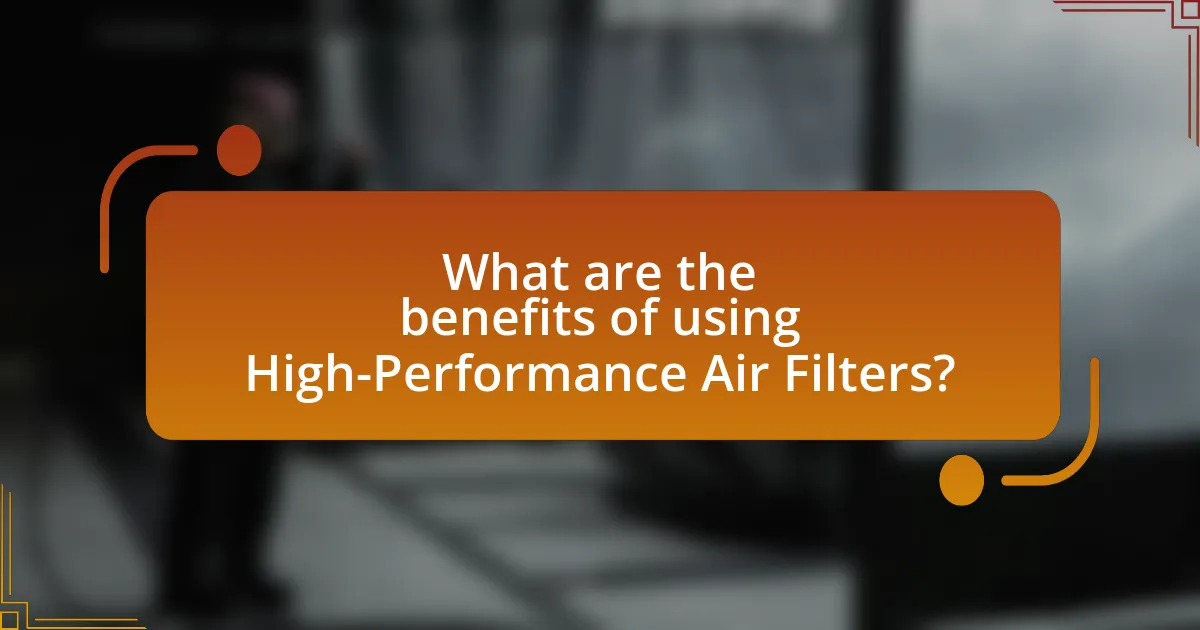
What are the benefits of using High-Performance Air Filters?
High-performance air filters enhance engine efficiency by improving airflow and filtration. These filters allow for a greater volume of air to enter the engine, which can lead to increased horsepower and torque. Additionally, they capture smaller particles and contaminants more effectively than standard filters, resulting in better engine protection and longevity. Studies have shown that vehicles equipped with high-performance air filters can experience up to a 10% increase in horsepower, demonstrating their effectiveness in optimizing engine performance.
How do High-Performance Air Filters improve engine power?
High-performance air filters improve engine power by increasing airflow to the engine while maintaining optimal filtration. This enhanced airflow allows for a more efficient combustion process, resulting in better fuel efficiency and increased horsepower. Studies have shown that vehicles equipped with high-performance air filters can experience power gains of up to 10-20%, depending on the engine type and other modifications. The improved design of these filters reduces airflow restrictions compared to standard filters, enabling the engine to breathe more freely and perform at a higher level.
What is the impact of increased airflow on engine output?
Increased airflow enhances engine output by improving combustion efficiency. When an engine receives more air, it can burn more fuel effectively, leading to greater power generation. This relationship is supported by the principle that optimal air-fuel mixtures are crucial for maximizing engine performance. For instance, studies have shown that engines can achieve up to a 10-20% increase in horsepower with improved airflow, particularly when utilizing high-performance air filters that reduce intake restrictions.
How do High-Performance Air Filters affect throttle response?
High-performance air filters enhance throttle response by allowing a greater volume of air to flow into the engine compared to standard filters. This increased airflow improves the engine’s ability to breathe, resulting in quicker acceleration and more immediate throttle response. Studies have shown that vehicles equipped with high-performance air filters can experience a noticeable reduction in turbo lag and improved power delivery, as the engine can more efficiently mix air and fuel. For example, a test conducted by K&N Engineering demonstrated that their high-flow air filters could increase horsepower by up to 10% in certain applications, directly correlating with improved throttle responsiveness.
What are the long-term advantages of using High-Performance Air Filters?
High-performance air filters provide long-term advantages such as improved engine efficiency, enhanced fuel economy, and extended engine life. These filters allow for better airflow and filtration, which leads to optimal combustion and reduced engine strain. Studies indicate that vehicles equipped with high-performance air filters can experience a fuel economy increase of up to 10%, as they facilitate a more efficient air-fuel mixture. Additionally, by trapping more contaminants, these filters help prevent engine wear and tear, contributing to a longer lifespan for the engine components.
How do these filters extend engine life?
High-performance air filters extend engine life by improving airflow and filtration efficiency, which reduces engine wear and enhances combustion. These filters allow for a greater volume of clean air to enter the engine, promoting optimal fuel combustion and reducing the buildup of harmful contaminants. Studies have shown that engines equipped with high-performance filters can experience less carbon buildup and lower oil contamination, leading to longer intervals between maintenance and repairs. Additionally, cleaner air intake helps maintain engine temperature, preventing overheating and prolonging engine components’ lifespan.
What maintenance benefits do High-Performance Air Filters provide?
High-performance air filters provide enhanced engine protection and improved airflow, which leads to better engine efficiency. These filters are designed to trap more contaminants than standard filters, reducing wear on engine components and extending their lifespan. Additionally, they often require less frequent replacement, which lowers maintenance costs over time. Studies indicate that high-performance air filters can improve airflow by up to 30%, resulting in increased horsepower and fuel efficiency.
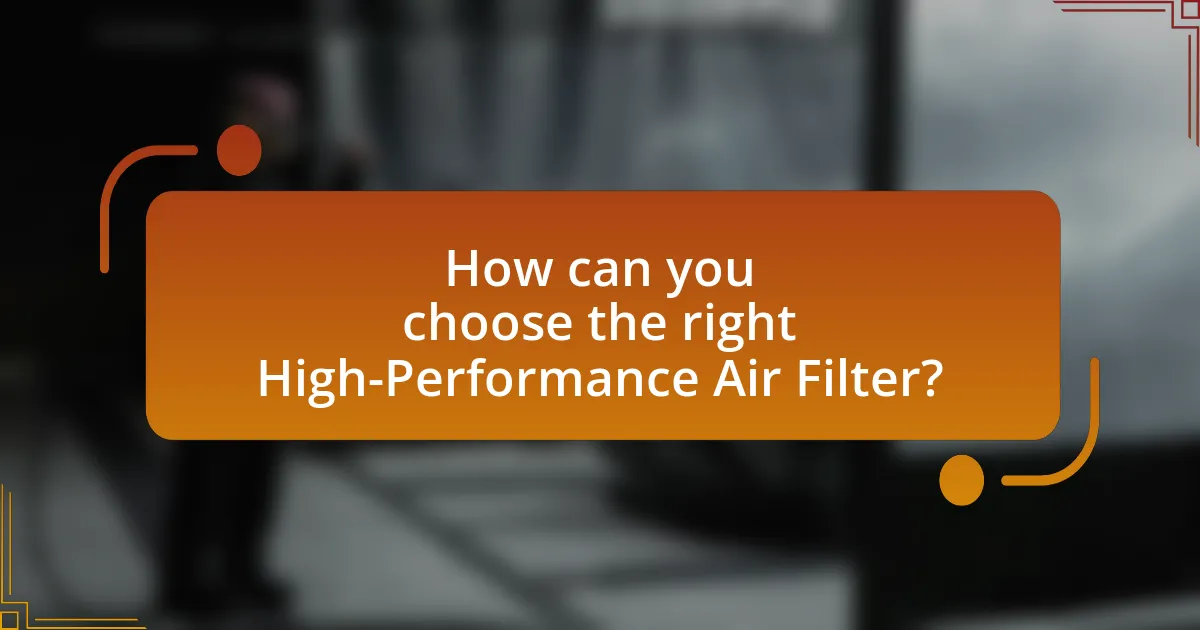
How can you choose the right High-Performance Air Filter?
To choose the right high-performance air filter, assess the filter’s compatibility with your vehicle’s make and model, as well as its filtration efficiency and airflow characteristics. High-performance air filters are designed to enhance engine efficiency by improving airflow while effectively trapping contaminants. Look for filters made from high-quality materials, such as cotton or synthetic fibers, which provide better filtration and durability. Additionally, consider filters that are washable and reusable, as they can offer long-term cost savings and environmental benefits. Research specific brands and models, as some filters have been shown to increase horsepower and torque, such as K&N filters, which are known for their high airflow rates and filtration efficiency.
What factors should you consider when selecting a High-Performance Air Filter?
When selecting a high-performance air filter, consider filtration efficiency, airflow capacity, and compatibility with your vehicle’s engine. Filtration efficiency is crucial as it determines how effectively the filter captures contaminants; high-performance filters often use advanced materials to achieve higher filtration rates. Airflow capacity is important because a filter that restricts airflow can negatively impact engine performance; high-performance filters are designed to maximize airflow while maintaining filtration. Compatibility ensures that the filter fits your specific engine model and meets its requirements, as improper fit can lead to reduced performance or damage.
How does vehicle type influence filter selection?
Vehicle type significantly influences filter selection by determining the specific airflow requirements and engine configurations. Different vehicles, such as sports cars, trucks, and SUVs, have varying engine sizes and performance needs, which necessitate tailored air filters to optimize airflow and filtration efficiency. For instance, high-performance vehicles often require filters that can handle increased air intake to enhance engine power, while larger vehicles may need filters designed for durability and higher filtration capacity to manage heavier loads. This specificity is supported by data indicating that performance air filters can improve horsepower by 5-10% in certain vehicle types, demonstrating the direct correlation between vehicle characteristics and filter effectiveness.
What specifications should you look for in a High-Performance Air Filter?
When selecting a high-performance air filter, prioritize specifications such as filtration efficiency, airflow rate, and material quality. Filtration efficiency, often measured by the Minimum Efficiency Reporting Value (MERV), indicates how effectively the filter captures particles; a higher MERV rating signifies better filtration. Airflow rate, typically expressed in cubic feet per minute (CFM), should be optimized to ensure that the engine receives adequate air without restriction, enhancing performance. Additionally, the material quality, such as synthetic or cotton gauze, affects durability and filtration capabilities; for instance, cotton gauze filters often provide better airflow while maintaining good filtration. These specifications collectively contribute to improved engine efficiency and performance, validating their importance in the selection process.
What are common misconceptions about High-Performance Air Filters?
Common misconceptions about high-performance air filters include the belief that they always provide a significant increase in horsepower and that they require frequent replacement. While high-performance air filters can improve airflow and potentially enhance engine efficiency, the actual horsepower gain varies by vehicle and is often minimal, typically ranging from 1 to 5 percent. Additionally, many high-performance filters are designed to be reusable and can last for up to 50,000 miles or more with proper cleaning, contrary to the assumption that they need to be replaced regularly. This durability is supported by manufacturers like K&N, which states that their filters can be cleaned and reused, offering a long-term cost-effective solution.
Do High-Performance Air Filters require more frequent maintenance?
High-performance air filters do not necessarily require more frequent maintenance compared to standard filters. While they may have a higher filtration efficiency and can trap more particulates, their design often allows for longer service intervals. For instance, many high-performance air filters are washable and reusable, which can extend their lifespan and reduce the frequency of maintenance. Additionally, manufacturers typically provide specific maintenance guidelines that indicate optimal cleaning and replacement schedules, often ranging from 10,000 to 50,000 miles depending on driving conditions.
Are all High-Performance Air Filters suitable for every vehicle?
No, all high-performance air filters are not suitable for every vehicle. High-performance air filters are designed to enhance airflow and filtration efficiency, but their compatibility varies based on specific vehicle models and engine types. For instance, some filters may fit certain makes and models while being incompatible with others due to differences in size, shape, or engine requirements. Additionally, using an unsuitable air filter can lead to reduced performance or potential engine damage, as highlighted by manufacturers who specify particular filter types for optimal operation.
What are the best practices for installing and maintaining High-Performance Air Filters?
The best practices for installing and maintaining high-performance air filters include ensuring a proper fit, regularly checking for damage, and cleaning or replacing the filter as needed. Proper installation requires verifying that the filter is securely seated in the air intake system to prevent unfiltered air from entering the engine. Regular inspections should be conducted to identify any tears or blockages that could impede airflow. Cleaning reusable filters according to the manufacturer’s guidelines, typically every 10,000 to 15,000 miles, helps maintain optimal performance. Additionally, replacing disposable filters at recommended intervals ensures consistent engine efficiency and longevity. These practices are supported by automotive maintenance guidelines that emphasize the importance of clean air intake for engine performance.
How can you ensure proper installation of a High-Performance Air Filter?
To ensure proper installation of a High-Performance Air Filter, first, clean the air filter housing to remove any debris or contaminants. This step is crucial because a clean environment allows the filter to function optimally, preventing dirt from entering the engine. Next, align the filter correctly with the housing, ensuring that it fits snugly without gaps, as improper sealing can lead to unfiltered air entering the engine, which can cause damage over time. Finally, secure the filter in place using the manufacturer’s recommended clips or screws, as this ensures stability during operation. Following these steps will enhance engine efficiency and prolong the lifespan of the air filter.
What maintenance tips can help maximize the lifespan of High-Performance Air Filters?
To maximize the lifespan of high-performance air filters, regular cleaning and timely replacement are essential. High-performance air filters can accumulate dirt and debris, which can restrict airflow and reduce efficiency. Cleaning these filters every 15,000 to 30,000 miles, depending on driving conditions, helps maintain optimal performance. Additionally, replacing the filter as recommended by the manufacturer, typically every 50,000 to 100,000 miles, ensures that the filter continues to function effectively. Regular inspections for damage or wear also contribute to longevity, as any compromised filter can negatively impact engine performance.
